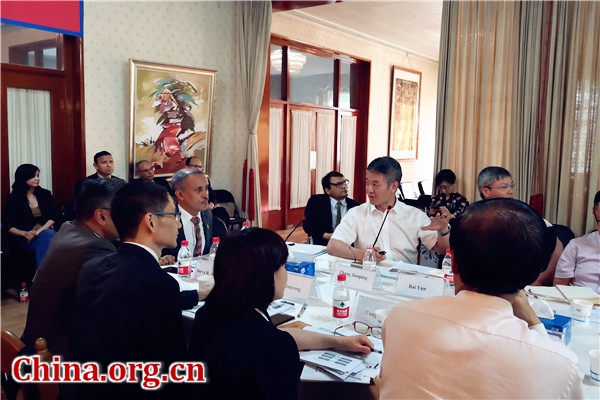Forum on trans-Himalayan connectivity held in Beijing

cof
Beijing, July 5/ A think tank forum titled the Trans-Himalayan Multi-Dimensional Connectivity Network: Opportunities and Challenges was held at the Embassy of Nepal in Beijing on July 4.
The forum brought together about 30 scholars and experts from universities and think tanks of Nepal and China in the fields of infrastructures, energy, transportation, international relations and global affairs.
Nepalese Ambassador to China Leela Mani Paudyal said in his keynote speech that the forum was organized to discuss opportunities to cooperate on connectivity through academic exchanges between Nepali and Chinese experts.
During the official visit of Nepalese Prime Minister KP Sharma Oli to China in June, the leaders of the two countries agreed on a vision for the development of connectivity infrastructures between China and Nepal. During the visit, both leaders signed deals including a memorandum of understanding on trans-Himalayan railway connectivity.
According to ambassador Paudyal, developing these important infrastructures between Nepal and China will contribute significantly to socio-economic development in the region.
Dr. Surya Raj Acharya, a research professor at the Center for Infrastructure Development and Studies at the Institute of Engineering of Tribhuvan University highlighted the significance of Nepal-China transport connectivity to further trade, investment and tourism, and to promote industrialization through access to global value chains.
“A Nepal-China transport link opens range of opportunity for Nepal, which ultimately would open doors to China-India connectivity,” he said, adding that China’s unprecedented progress in engineering and technology makes better connectivity possible.
Acharya also hailed the Belt and Road Initiative (BRI), saying it was very timely and appropriate for Asian prosperity.
Zhang Jianping, senior researcher at Chinese Academy of International Trade and Economic Cooperation of China’s Ministry of Commerce, emphasized that the Belt and Road Initiative was neither a project, program or strategy, nor China’s version of the Marshall Plan.
“The BRI is a comprehensive platform for cooperation and development, which is open and inclusive,” he said, adding that connectivity under the BRI plays a supportive role in promoting Nepal’s socio-economic development.
In his speech, the ambassador called on think tank experts and civil servants of both countries to meet more frequently to discuss innovative ideas, identify priorities and recommend appropriate policies based on the vision of the two nations’ leaders.
Other representatives from Tongji University and Renmin University of China and think tanks like the Global Energy Interconnection Development and Cooperation Organization, as well as the Belt and Road Institute of the Center for China and Globalization, also spoke at the forum.
http://www.china.org.cn/world/2018-07/05/content_55006797.htm
